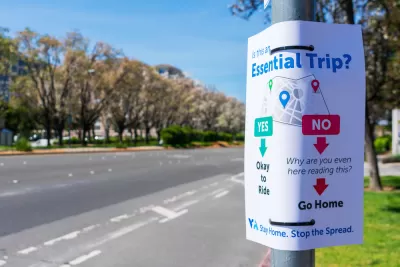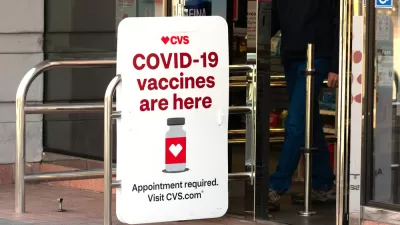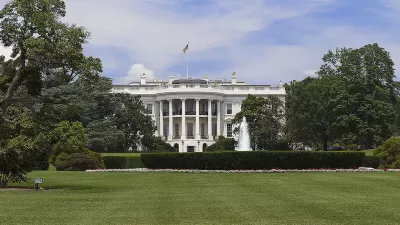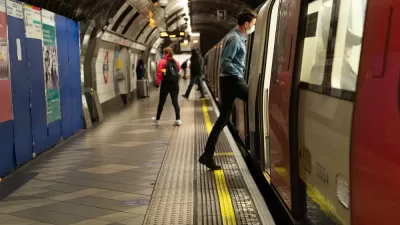It's official—the nation's leading public health agency would prefer that Americans drive alone to work to reduce exposure to the coronavirus. New CDC guidance call for government to subsidize drive-alone and single ride-share commutes.

The header of the New York Times article published on Friday dealt a body blow to transit agencies, stating that the Centers for Disease Control and Prevention (CDC) recommends, "Temperature checks, desk shields and no public transit..." in the age of the contagious novel coronavirus.
"The C.D.C. recommended that the isolation for employees should begin before they get to work — on their commute," writes . "In a stark change from public policy guidelines in the recent past, the agency said individuals should drive to work — alone."
Actually, their guidance, "COVID-19 Employer Information for Office Buildings," released May 27, does not say, "no public transit," but it's easy to see why the Times chose that wording. Their recommendations deal almost exclusively with the buildings themselves, with the exception of one bullet point under "Administrative controls: Change the way people work."
- For employees who commute to work using public transportation or ride sharing, consider offering the following support:
- Offer employees incentives to use forms of transportation that minimize close contact with others, such as offering reimbursement for parking for commuting to work alone or single-occupancy rides.
- Allow employees to shift their hours so they can commute during less busy times.
- Ask employees to wash their hands as soon as possible after their trip.
In short, the CDC is essentially telling workers to get in their own motor vehicle, drive to work, preferably during off-peak hours, and remember to wash their hands before and after their driving commute.
As for ride-sharing alternatives, the Washington Post even ruled out that option in their write-up of the new guidance:
"The CDC recommendations say workers should be encouraged to drive alone rather than sharing rides or taking public transportation," wrote and
CDC guidance for mass transit
Also on the CDC website is a "Mass Transit Decision Tool" directed to public transit agencies:
Mass transit is critical for many Americans to commute to/from work and to access essential goods and services. Mass transit may need to remain open and certain routes prioritized. Follow these guidelines for bus transit operators, rail transit operators, transit maintenance workers, and transit station workers.
Among the recommendations:
- Encourage social distancing by increasing spacing of passengers and employees, closing every other row of seats and using bus rear door entry/exit, if feasible
As for public transit within the office building, i.e., elevators, their recommendation is consistent: "Limit use and occupancy of elevators to maintain social distancing of at least 6 feet."
Related in Planetizen:
-
Elevators Are Not the Villain, May 11, 2020
-
White House Shelves Reopening Guidelines Prepared by CDC, May 10, 2020
-
Subway-Coronavirus Connection Suffers From Lack of Evidence, April 20, 2020
Hot tip to Kenyon Karl.
FULL STORY: C.D.C. Recommends Sweeping Changes to American Offices

Maui's Vacation Rental Debate Turns Ugly
Verbal attacks, misinformation campaigns and fistfights plague a high-stakes debate to convert thousands of vacation rentals into long-term housing.

Planetizen Federal Action Tracker
A weekly monitor of how Trump’s orders and actions are impacting planners and planning in America.

In Urban Planning, AI Prompting Could be the New Design Thinking
Creativity has long been key to great urban design. What if we see AI as our new creative partner?

King County Supportive Housing Program Offers Hope for Unhoused Residents
The county is taking a ‘Housing First’ approach that prioritizes getting people into housing, then offering wraparound supportive services.

Researchers Use AI to Get Clearer Picture of US Housing
Analysts are using artificial intelligence to supercharge their research by allowing them to comb through data faster. Though these AI tools can be error prone, they save time and housing researchers are optimistic about the future.

Making Shared Micromobility More Inclusive
Cities and shared mobility system operators can do more to include people with disabilities in planning and operations, per a new report.
Urban Design for Planners 1: Software Tools
This six-course series explores essential urban design concepts using open source software and equips planners with the tools they need to participate fully in the urban design process.
Planning for Universal Design
Learn the tools for implementing Universal Design in planning regulations.
planning NEXT
Appalachian Highlands Housing Partners
Mpact (founded as Rail~Volution)
City of Camden Redevelopment Agency
City of Astoria
City of Portland
City of Laramie





























